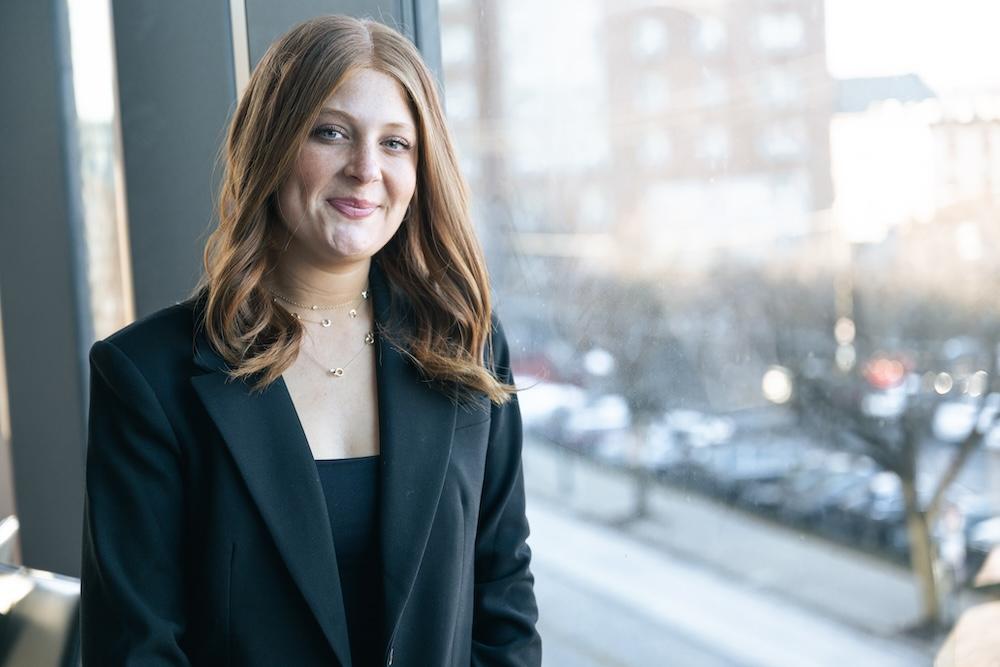Navigating Disasters and Gender Inequality in Uganda
Julia Klayman ‘25 employs ethnographic research and community engagement to investigate the impact of landslides on women, uncovering the complex intersection of gender and health in Bududa
When Julia Klayman ‘25 first volunteered with the Pathways to Development Initiative, the local NGO in Bududa, Uganda, she never expected to spend her subsequent summers conducting research on transactional sex. The region’s rural landscape and frequent natural disasters disproportionately impact women, especially young women, who often engage in transactional sex to secure basic necessities, services like taxi rides, or even luxury goods.
A global studies and political science double major, Klayman has always been interested in volunteering and working with women and children. After exploring the region and getting to know the community, she observed a stark gender disparity. “Men are placed on this pedestal and women are looked at as second class-citizens,” she says. This realization inspired her to investigate how landslides affect women and the coping mechanisms they employ to deal with the aftermath.
Natural Disasters
While Bududa is known for its terrible, destructive landslides, Klayman admits their frequency is tied to climate change. “Landslides plague this region, and when you're walking around on foot, you're walking on muddy roads,” she says. “Because of increased rain over the past couple of years, the landslides have really been exacerbated.”
“Eighty percent of deadly landslides occur in these tropical regions where the world’s extreme poor population lives,” Klayman explains. Women are particularly vulnerable in such situations because they are expected to continue their domestic responsibilities.
“After landslides occur, people are going hungry, people don't have shelter, people don't have access to any sort of healthcare, and they're turning to transactional sex to be able to make money in order to get those basic necessities.”
Transportation
Motorcycle taxi drivers, known throughout east Africa as boda bodas, have an advantage in such a large, hilly community. As a result, they have the means to engage in transactional sex at incredibly high rates.
“They're able to convince these young girls who have incredibly long commutes to school [to engage in transactional sex]. A girl could be walking from the top of the hill two hours down to school and then two hours back home when it's dark outside,” Klayman says.
Interviewing men about such a sensitive topic proved challenging. With the help of fellow Lehigh student Baxter Reihman ‘25, Klayman was able to gather valuable insights, partially from boda boda drivers.
Not only are boda boda drivers able to transport many people throughout the community with ease, “they’re also transporting disease at exceptionally high rates. Whether that's HIV or other sexually transmitted diseases.”
Health and Community Impact
Despite HIV posing greater long-term health risks, the immediate concerns about pregnancy are perceived as a greater threat.
“Women feared pregnancy because it was something that was visible,” Klayman says. Women who become pregnant might resort to dangerous abortions or be forced to drop out of school. Abortion is illegal in Uganda so some women turn to self-administered methods, like herbal abortifacients, which can lead to death.
Social consequences fuel the fear of pregnancy for men in the community too. “The men didn't want the commitment of having a pregnancy, but also they didn't want other people to know that they were engaging in transactional sex.”
HIV/AIDS, on the other hand, isn’t visible like pregnancy. “When you have HIV, it's something that other people don't know about. So they're able to hide it, whether they're taking antiretrovirals or not.”
HIV is seen as a “treatable” disease, yet there’s a prevalent fear of doctors and people are afraid to go into clinics. The drug PrEP significantly lowers one’s chance of contracting HIV if taken within 36 hours of unprotected sex, yet even though it’s accessible, people won’t get it, Klayman notes.
The lack of fear for HIV is alarming and some men, “malicious men” as women in the community call them, admit to purposely spreading the disease so they wouldn’t have to die alone. “I think it’s so telling of community norms and the views on HIV in the community,” Klayman adds.
An influx of money during seasons like coffee harvest, circumcision ceremonies, and holidays see spikes in transactional sex activity, which in turn sees a spike in HIV. In a community with sustained gender vulnerabilities, women engage in transactional sex to provide short-term, financial relief.

Lehigh and Beyond
Klayman’s research experience at Lehigh has been invaluable and she’s working on publishing two articles. “Working hand in hand with Dr. [Kelly] Austin and Dr. [Mark] Noble not only taught me how to engage in ethnographic research and participatory research, but how to navigate different community norms and different social and cultural climates, which is an experience I don't think I would have otherwise if it weren't for Lehigh.”
Support from the university enabled her to conduct fieldwork in Bududa and pursue her passion for social justice and global health. “Because of this experience, it really showed me the impact of law on different kinds of communities,” Klayman says, who will be attending law school next year. “It really shaped my career and my whole life.”

